People
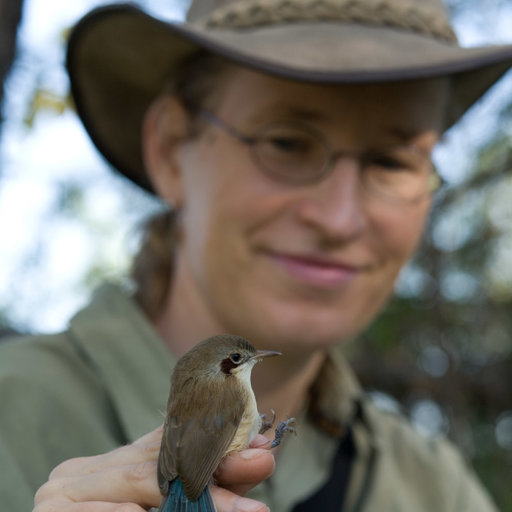
Dr Anne Peters
Principal Investigator
ARC Future Fellow
PhD, ANU
Email: anne.peters@monash.edu
As a student completing her BSc/MSc in the Netherlands Anne studied mating behaviour and the reproductive ecology of turtles, flatworms and fish in various countries. Anne completed her PhD at the Australian National University (ANU), Canberra, in 2001. The project (‘Testosterone and life-history trade-offs in superb fairy-wrens, Maluruscyaneus’) investigated whether trade-offs between investment in courtship behaviour and ornamentation, offspring care and immune activity might be regulated by testosterone. She was an Alexander von Humboldt Foundation Research Fellow at the Max Planck Research Centre for Ornithology, Seewiesen, Germany. From 2004-2011 Anne led a research group at the Max Planck Institute for Ornithology. Anne joined Monash University as a Senior Lecturer in 2011.
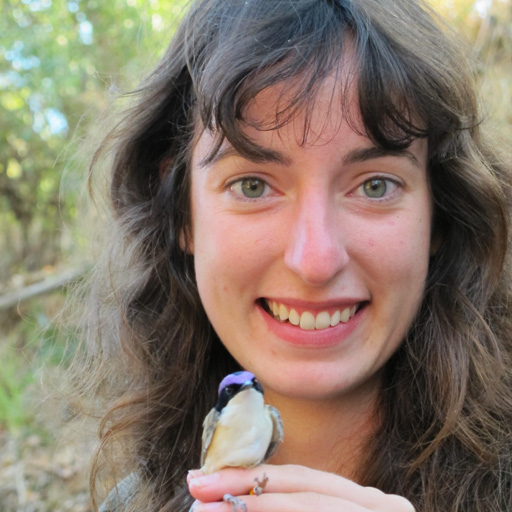
Dr Niki Teunissen
Postdoctoral Associate
Post-doc, Wageningen University
PhD, Monash
MSc, Groningen, NL
Email: niki.teunissen@monash.edu
Niki has been involved with the purple-crowned fairy-wren project since 2014. She is interested in what drives subordinate helping decisions – how and why do some birds help? She showed how complex social interactions really are in purple-crowned fairy-wrens in two papers in Behavioral Ecology, in BEAS and a fascinating story in Current Biology. Turns out, wrens cooperate to obtain benefits of current group members and of raising young. Recently, she showed that the arrival of cane toads did not improve nest predation.

Dr Justin Eastwood
Postdoctoral Associate
PhD, Deakin
Email: justin.eastwood@monash.edu
Justin’s research interests span ecology and evolution. He studies aging, life-history and disease in natural populations of birds. IN collaboration with Anne and Prof. Simon Verhulst (Uni of Groningen) he investigates telomere dynamics in purple-crowned and superb fairy-wrens funded by ARC Discovery grants (DP15, DP18 and DP21). See Molec Ecol Res, Molec Ecol and PNAS for his publications on telomeres in purple-crowned fairy-wrens, and Molec Ecol for telomeres in superb fairy-wrens and a meta-analysis.
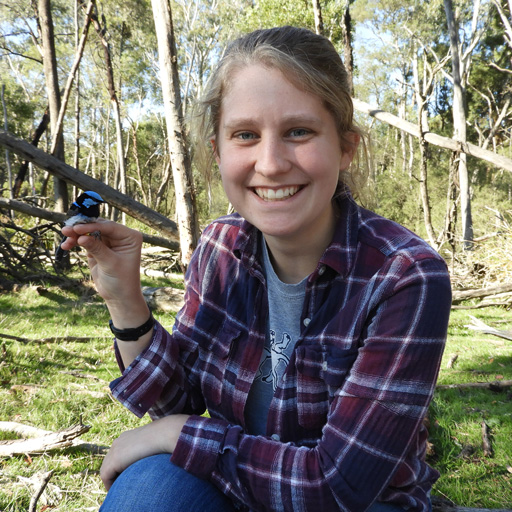
Jenna Diehl
PhD Candidate
BS Biology, Pennsylvania
State University, US
Email: jenna.diehl@monash.edu
Jenna is investigating how early life heat exposure influences a birds physiological development and how that might impact a how birds respond to heat exposure in the later life. She will also be looking at the ways in which the adults can mitigate these effects. Her research will be focused around the nests of the superb fairy-wrens found in Lysterfield Lake park in Victoria. She is co-supervised by Dr. Lesley Alton.

Greg Taylor
PhD Candidate
BSc, Orlando, FL
MSc, San Jose, CA
Email: Gregory.Taylor@monash.edu
Greg is studying the effects of heat stress on the physiology and behavior of adult superb fairy-wrens. He is particularly interested in investigating sperm production, cognition, and social behaviour, all of which have received much attention in human-focused heat stress research, but which have been largely overlooked in other taxa. He is co-supervised by profs. Craig White and Bob Wong and advised by Dr. Melissah Rowe at NIOO (NL).

Abigail Robinson
PhD Candidate
BSc, Edinburgh, UK
MSc, Exeter, UK
Email: Abigail.Robinson@monash.edu
Abi is interested in the evolutionary stability of cooperative breeding in species with high rates of extra-group paternity. She studies superb fairy-wrens at Lysterfield park and will investigate what benefits drive subordinates to help, how helpers benefit breeders and the influence of the genetic mating system in determining these benefits. She will use a series of field experiments accompanied by a meta-analyis and model to address these questions. She is co-supervised by Dr. Tim Connallon and advised by Sjouke Kingma in Wageningen (NL).

Ian Hoppe
PhD Candidate
BSc and MSc Nebraska, US
Email: ian.hoppe@monash.edu
Ian is broadly interested in behavioural ecology, especially in the broad spaces in which it overlaps with disease processes and the conservation of vulnerable species. Past field work has taken Ian from the Great Plains of the US to the Murraylands of Australia as well as the Southern Lowlands and island provinces of New Guinea in search of birds, adventure, and understanding. For his PhD he is focussing on the conservation ecology of Purple-crowned fairy-wrens, hoping to spend much of his time at AWC’s Mornington Wildlife Sanctuary.
Website – https://irhoppe.github.io
Google Scholar
ResearchGate

Ariana La Porte
PhD Candidate
MSc Arizona, BSc Wesleyan, US
Email: ariana.laporte@monash.edu
Ariana is broadly interested in heat stress and habitat use, and is studying the potential for microclimates to buffer climate change impacts for the Purple-crowned fairy-wren. She will be examining the trade-off adults make to protect both themselves and their nestlings from excessive heat, and whether these strategies could still be effective under changing climate conditions. Her first contribution to the purple-crowned fairy-wren project was published recently; she showed how nest temperatures measured with black bulbs vary with air temperatures from weather stations.

Peter Vaughan
PhD Candidate
BSc (U Tasmania)
Email: peter.vaughan@monash.edu
Co-supervised with Rohan Clarke
Peter is studying the Vanuatu Petrel (Pterodroma [cervicalis] occulta) as a case study for conservation of gadfly petrels, among the most poorly known birds. His research involves movement ecology, threat profile, and taxonomy. He also works as a consulting ecologist.
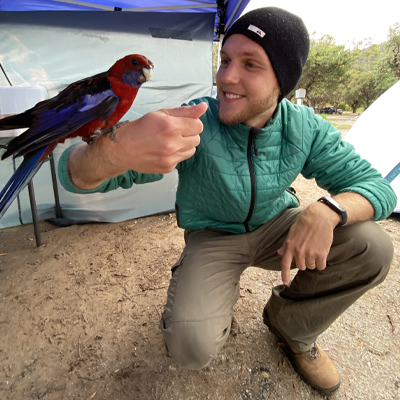
Gabriel Melhado
PhD Candidate
MSc, Sao Paulo State University, Brazil
Email: gabriel.melhado@gmail.com
Co-supervised with Prof Bob Wong and Dr Upama Aich.

Karina Sorrell
PhD Candidate
Email: karina.sorrell@monash.edu
Co-supervised with Rohan Clarke
Karina is interested in improving the conservation of tropical island ecosystems. To do this, she is studying the ecological restoration of Browse Island Nature Reserve off the Kimberley coast of Western Australia, with a focus on restoring seabird breeding colonies. Past field work has involved flying drones to improve monitoring for fur seals and seabirds, Tasmanian Devil trapping, and bird surveys from the Victorian mallee to remote offshore islands.

Isabelle (Issy) Dimos
Honours Student 2024
Issy has a passion for the outdoors and wildlife. She has a keen interest in understanding how our natural world works. For her Honours project Issy will study climatic effects on intra-specific colour variation of Australian birds, using museum specimens. Kaspar Delhey is her advisor.

Nell Glover
Honours Student 2024
Nell is interested in threatened species ecology and sustainable land management. For her Honours, she will work with Kath Selwood from ZoosVic to study habitat requirements of endangered mallee emu-wrens.
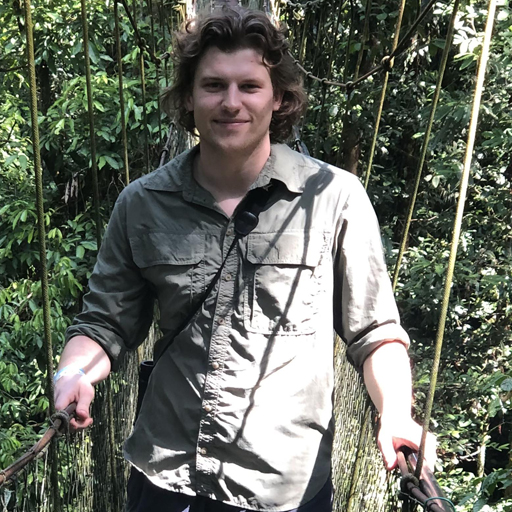
Tommy Landmann
Honours Student 2024
Tommy has been a passionate birdwatcher from a young age. For his Honours project he will travel to the long-term study site at AWC Mornington-Marion Downs Sanctuary and investigate avian biodiversity in relation to fire history and habitat quality. Co-supervised by Niki Teunissen and Skye Cameron
Collaborators
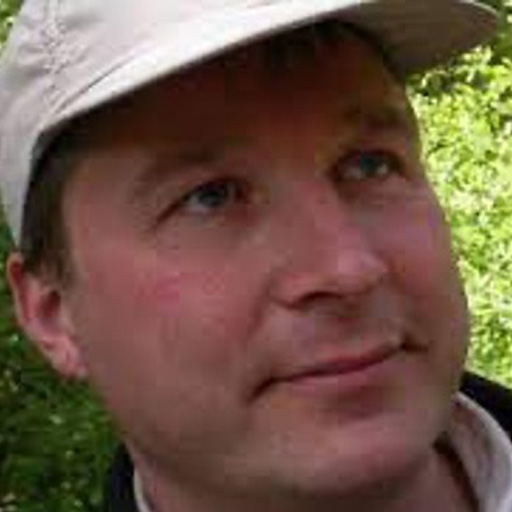
Prof. Simon Verhulst
Rijksuniversiteit Groningen
We have been collaborating with Simon since 2013, when Anne visited his research group. Simon’s research group studies the evolution and process of senescence in a life-history context, mostly in birds, in the lab and in the field. With respect to the senescence process, their main focus is on telomeres and factors affecting telomere dynamics (e.g. oxidative stress). Telomere ecology ( and ecological immunology are our main overlapping interests, for examples see here , here and here.

Dr. Melissah Rowe
Netherlands Institute of Ecology
We started collaborating with Melissah at the height of the pandemic, developing a project on pre- and post-copulatory sexual selection and trade-offs with parental care. Melissah is an internationally recognised avian sperm expert who studies reproductive biology and factors that influence ejaculate biology and sperm form and function in birds. Together we are trying to understand male superb fairy-wren investment in sperm characteristics, and how this co-varies with investment in sexual signals. The first results are promising (and we have learnt that analysing sperm is hard). We hope to have more in-person collaborations soon.

Dr Sjouke Kingma
Wageningen University
PhD Konstanz
Sjouke’s research interests focus mainly on the causes and consequences of avian cooperative breeding and how this interacts with the mating system. He completed his PhD thesis on “The evolution of the social and genetic mating system of purple-crowned fairy-wrens Malurus coronatus”. He has remained involved in the purple-crowned fairy-wren project see here and here for recent publications. Sjouke is now based at the Wageningen University as assistant professor (universitair hoofddocent) in the Netherlands.
Twitter – @SjoukeKingma
Website – behaviouralecology.nl
Website – wur.nl
Google Scholar

Dr Kaspar Delhey
Max Planck Institute for Ornithology
PhD, LMU München
Kaspar has studied birds all his life. He is an all-round ornithologist with broad interests ranging from community ecology to foraging behaviour and from extra-pair paternity to bird cosmetics. His main research aim at the moment is to develop an understanding of the diversity of bird colours, for example. Field biologist by preference, he also does extensive research in museum collections and enjoys spending long hours on data analyses in R.

Dr Michelle Hall
PhD ANU
Website
Publications
Google Scholar
Twitter: @MichelleLHall6
Past PhD Students

Dr Ettore Camerlenghi
PhD Monash (2023)
MSc, Padova, Italy
Ettore is interested in how the social structure of animal societies is formed by both the intrinsic (e.g. group composition, individual phenotypes, life history) and extrinsic (e.g. habitat quality, predation risk) features. Studying superb fairy-wrens (Malurus cyaneus), at Lysterfield park, he adopts social network analysis to understand their complex social structure. He is co-supervised by Dr Carly Cook and collaborates with Dr Sjouke Kingma and Prof. Damien Farine. His first manuscript linking cooperative breeding to complex multi-level sociality was published in Ecology Letters; with an accompanying Conversation piece. His second appeared in Current Biology, also with a Conversation article.
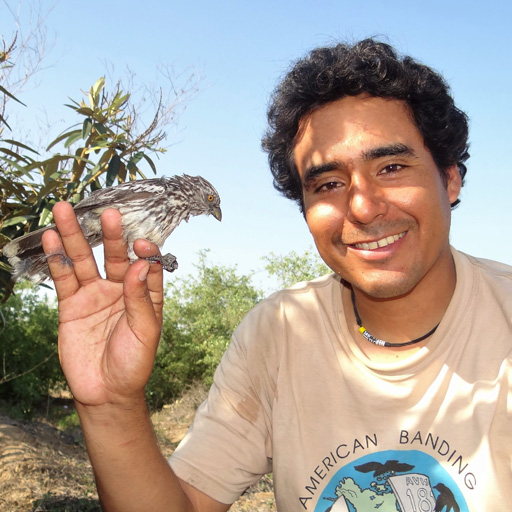
Dr Sergio Nolazco Plasier
PhD Monash (2022)
BSc, Lima, Peru
MSc, Sao Paulo, Brazil
Email: sergio.nolazco@ib.usp.br
Sergio studied the evolution of female ornamentation, showing in a large meta-analysis its signalling potential in males and females is the same. He also conducted a case study on purple-crown fairy-wrens to investigate whether there is an adaptive significance for the seasonal breeding plumage of females by testing its associations with multiple fitness components looking at moult timing and plumage colour.

Dr Michael Roast
PhD Monash (2020)
MSc, Exeter, UK
Email: michaeljroast@gmail.com
Michael’s PhD research was focused on the ecoimmunology of the purple-crowned fairy-wren. His first paper was part of a special issue in PBZ and investigated how innate immunity varies with climate and habitat. A paper in PRSB investigated fitness consequences of immune variation. He showed that constitutive innate immunity does not show senescence and relates to telomere length independently of age.
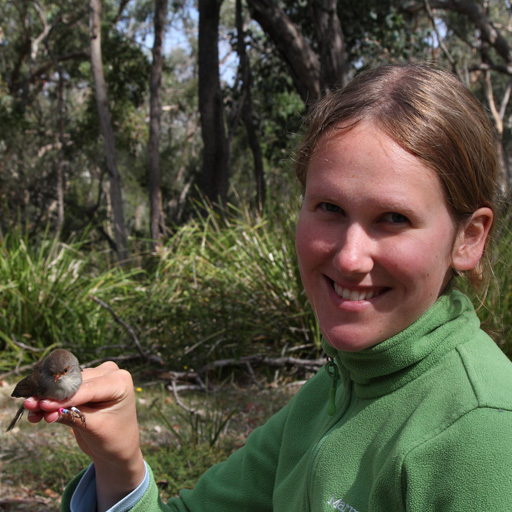
Dr Alexandra McQueen
PhD Monash (2019)
BSc (Hons) Monash
Email: a.mcqueen@deakin.edu.au
Alex studied the costs and benefits of seasonal colour in superb fairy-wrens. She showed that blue males have to spend more time hiding from predators – it isn’t easy being blue! A huge experiment showed that age constrains production of the blue plumage, but producing and maintaining it is not dependent on male quality! She also did a fantastic study of the evolutionary drivers of seasonal plumages. Alex is currently a post-doc at Deakin University.

Dr Marie Fan
PhD Monash (2019)
MSc, Exeter, UK
Email: marie.fan@monash.edu
Marie investigated the adaptive significance of seasonal male plumage in purple-crowned fairy-wrens, showing higher variability, higher heritability but no evidence of heighetend condition-dependence of ornamental colours. Although she found no fitness benefits of early moult, but males with more purple are more competitive towards other males! She also showed how feather microstructure contributes to colour diversity across fairy-wrens. Marie now works in eco-toxicology environmental assessment in France.

Dr Nataly Hidalgo Aranzamendi
PhD Monash (2016)
MSc Brasília, Brazil
Email: nhidalgoa@gmail.com
Nataly is originally from Peru, and she is passionate about birds and fieldwork. Her PhD was on ‘Life-history variation in a tropical cooperative bird: ecological and social effects on productivity’. To understand how, when and why purple-crowned fairy-wrens are (un)successful, she spent many months in the Kimberleys in north WA, at our field site at the AWC Mornington Wildlife Sanctuary. Nataly published here a very nice paper on divorce, and she showed how rain drives breeding in the wrens, affecting males, females, and their insect food. She now works as a data scientist in Belgium.
Past Honours Students

Amber Hodgson
Honours Student (2022/2023)
Amber is studying how superb fairy-wrens cooperate to defend against a predator, and whether this trades off against nestling provisioning. To answer this, she will present groups with a kookaburra taxidermy model and play back nestling distress calls, and quantify defense effort.
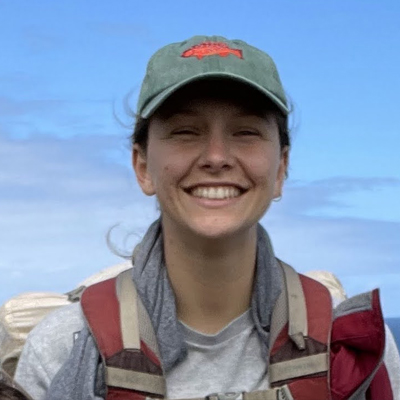
Riley Turnbull
Honours Student (2022/2023)
Riley is investigating how female superb fairy-wren allocation to self-care and offspring care changes when females experience hardship, and whether this varies depending on whether they have helpers. She will be placing cameras at nests during incubation and nestling feeding, and observing females.

Chelsea Rathbone
Honours Student (2020/21)
Chelsea is studying the effects of climate variation on offspring provisioning in the cooperatively breeding purple-crowned fairy-wren. She is studying how relative total feeding rate and relative contribution of helpers change with climatic conditions. Her results suggest that when the going gets tough, fairy-wrens do not increase their efforts, and cooperative breeding is unlikely to buffer against the impacts of climate change on offspring provisioning.

Lyndall Neate
Honours Student (2021/22)
Lyndall compared provisioning rates recorded in superb fairy-wrens by miniature cameras and in-person observers. The cameras were more effective. In-person observers missed one-third of female feeding trips but more than half by males. This suggests that previously estimated contribution of males to offspring care may not reflect their true or proportional effort.

Aedan Kertesi
Honours Student (2021/22)
Aedan investigated whether superb fairy-wrens show evidence of task divisioning or whether certain individuals always work harder. To do so, he quantified nestling provisioning and predator defense. He found that females provisioned offspring the most, but did not defend more, but across individuals, those that defended more intensely, were less inclined to provision nestlings. An intriguing result.

Emily Jarvis
Honours Student (2020/21)
Emily’s project ‘Artificial microhabitat use of the Agile Antechinus in wet-forest environments’, will look at whether the provision of artificial material (hessian fabric) can provide antechinus and native rodents with a suitable refuge from introduced predators, such as foxes and feral cats. Her study site is in South Gippsland and Dr. Chris Johnstone is co-supervisor. She obtained funding from an Australian Wildlife Society University Research Grant.

Rhiannon Myhre
Honours Student (2020/21)
Rhiannon investigated the benefits of receiving help in superb fairy-wrens. She found that helpers did not increase overall feeding rate, but they allowed female and male dominants to make less effort. Female dominants provisioned the most, female helpers the least, and males brought larger prey. Despite these somewhat mysterious results, Rhiannon fell in love with wrens@Lysterfield, and spent another two seasons working with us as research assistant following wrens and finding nests. She now works full time as an ecological consultant.

Dana Dekkers
Honours Student (2019)
Dana spent many hours roaming Lysterfield Park placing specially painted 3D models of male superb fairy-wrens in blue and brown plumage to test whether the former are attacked more. Interestingly this was not the case, irrespective of whether the models were placed singly or in small groups. Her thesis “Predation risk in relation to conspicuousness: a 3D printed model experiment” received a very good H1 mark.
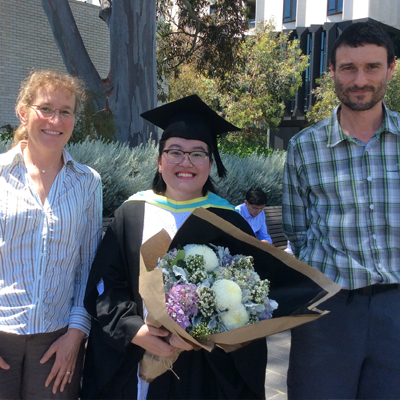
Audrey Prasetya
Honours Student (2018)
Audrey studied patterns of geographic variation in carotenoid-based colouration across Australian passerine birds. She spent a lot of time at the wonderful collections at Museums Victoria, who also generously supported her work through a Monash University-Museums Victoria Honours Scholarship. She was co-supervised with Dr Kaspar Delhey and graduated with flying colours.
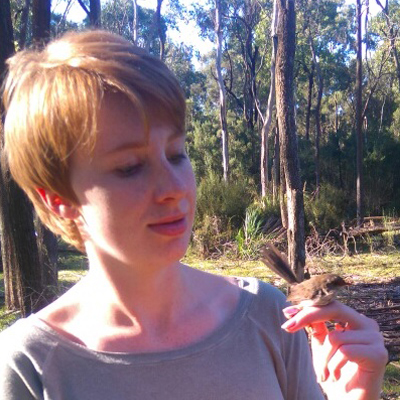
Clara Heiligenberg
Honours Student (2017)
Clara joined the group after completing a BSc at the University of Adelaide to study behaviour of superb fairy-wrens at Lysterfield Park. While she disentangled non-breeding season social behaviour using social network analysis, she fell in love with the wrens! She was co-supervised by Dr Carly Cook.

Annalise Naimo
Honours Student (2016)
Annie is particularly interested in behaviour, and its underlying causes. She investigated whether testosterone has effects on the behaviour of male superb fairy-wrens at Lysterfield Lake Park, teasing apart the effect of phenotype and hormones on behaviour in this species. After some travel Annie, started a PhD at Monash, but not on wrens…

Kate Waller
Honours Student (2015)
Kate investigated how investment in innate immunity and parasite loads vary in Welcome swallows breeding in pairs and colonies of different sizes. She did this in the Yarra Valley in collaboration with Alan Lill, who has been studying swallows there for years. A highlight of her study was ripping apart lots of infested swallow nests under her carport.
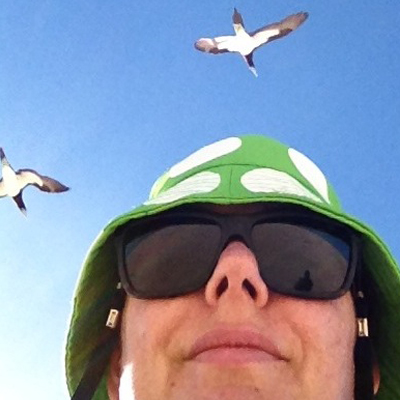
Kylie Fennessy
Honours Student (2014)
Kylie investigated eco-immunology of seabirds on Ashmore reef, in collaboration with the research group of Rohan Clarke. She compared sex differences in investment in innate immunity across boobies and frigate birds that have different sex roles. Currently she is following her passion for teaching, BIO1011 and BIO1022.

Niki Teunissen
Honours Student (2014)
Niki investigated potential direct benefits of group living in purple-crowned fairy-wrens. She compared condition and behaviour of helpers in groups of different sizes, with and without fledglings. After a second bonus field season, Niki returned again, and is now PhD student in the group. Her published research is here.
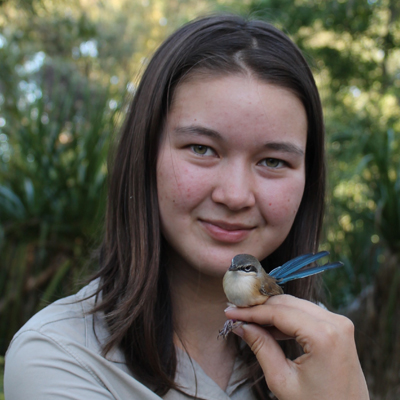
Annie Aulsebrook
Honours Student (2013)
Annie investigated the immune ecology of purple-crowned fairy-wrens, comparing between sexes and birds of different social status. She continued doing that as a research assistant before starting her PhD at Melbourne Uni in the group of Raoul Mulder studying the effect of light pollution. Read here about her honours research is on eco-immunology and on immunosenescence.

Lisa Mandeltort
Honours Student (2013)
Lisa studied the seasonal male breeding plumage of the purple-crowned fairy-wren, and its potential to act as a sexual signal. She now passes on her passion for science as a teacher.

Rowan Jaques-Hamilton
Honours Student (2012)
Rowan was interested in the link between innate immune investment and behavioural syndrome, which he studied in superb fairy-wrens in collaboration with Raoul Mulder and Michelle Hall.

Jesse Smith
Research Assistant (2011)
Jesse studied the relationship between colour variation and conservation status, under supervision of Anne and Kaspar.

